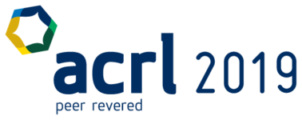 Brenna Helmstutler
Brenna HelmstutlerLibrarian for the School of Information Studies,
Syracuse University Libraries
Brenna Helmstutler has been in the field of academic librarianship for 15 years. She is currently the Librarian for the School of Information Studies (iSchool) at Syracuse University in which her responsibilities are both on-campus and online with the iSchool's 2U distance learning degree programs. Prior to joining Syracuse University Libraries, she was a subject librarian for several disciplines including Education and Nursing, which included distance learning activity, and also served as Team Leader of Health & Science at Georgia State University. She has presented at both ALA and ACRL conferences on scholarly impact and faculty information literacy, and has served on ULS and LLAMA committees.
 Samantha Harlow
Samantha HarlowOnline Learning Librarian,
University of North Carolina at Greensboro
Samantha (Sam) Harlow is the Online Learning Librarian at UNC Greensboro, as well as the liaison to Kinesiology and Public Health Education. She has been working in libraries, instructional technology, and with online learners for around 7 years.
 Breanne Kirsch
Breanne KirschUniversity Librarian,
Briar Cliff University
Breanne Kirsch is the University Librarian at the Bishop Mueller Library of Briar Cliff University in Sioux City, Iowa. Her Masters in Library and Information Science is from Dominican University. Currently, she is taking courses in the Master’s program in Education with a focus in Educational Technology with the University of South Carolina Aiken. She was recognized as an emerging leader in 2011 by ALA and founded the Game Making Interest Group within LITA. Breanne is a past Chair of the Imagineering Interest Group. Currently, she serves on the Publications Committee. In addition, she participated in a grant-funded ILEAD project through the South Carolina State Library in 2015 and led the group project that created a website to help librarians discover new technology tools (https://agoge.uscupstate.edu/findyourhat/). In 2018, her LITA Guide to No- or Low-Cost Technology Tools for Libraries was published. She has also presented at a number of conferences.
 Erin Richter-Weikum
Erin Richter-WeikumInformation & Research Specialist,
LEK Consulting

 Courtney Mlinar
Courtney Mlinar Terezita Overduin
Terezita Overduin Allison Hosier
Allison Hosier Megan Kinney
Megan Kinney Claire Lobdell
Claire Lobdell Kelly McElroy
Kelly McElroy Francesca Marineo
Francesca Marineo Alison Valk
Alison Valk Clare Withers
Clare Withers Diana Dill
Diana Dill David Nolen
David Nolen Sheeji Kathuria
Sheeji Kathuria Christine Iannicelli
Christine Iannicelli